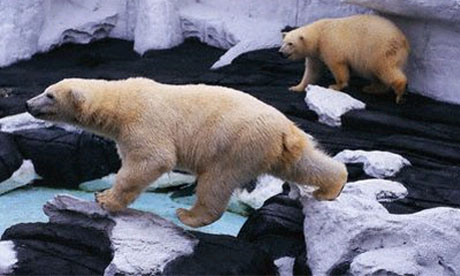
Academics meeting in Bristol at the weekend for Britain's first conference on the psychology of climate change argued that the greatest obstacles to action are not technical, economic or political — they are the denial strategies that we adopt to protect ourselves from unwelcome information.
It is true that nearly 80% of people claim to be concerned about climate change. However, delve deeper and one finds that people have a remarkable tendency to define this concern in ways that keep it as far away as possible. They describe climate change as a global problem (but not a local one) as a future problem (not one for their own lifetimes) and absolve themselves of responsibility for either causing the problem or solving it.
Most disturbing of all, 60% of people believe that "many scientific experts still question if humans are contributing to climate change". Thirty per cent of people believe climate change is "largely down to natural causes", while 7% refuse to accept the climate is changing at all.
How is it possible that so many people are still unpersuaded by 40 years of research and the consensus of every major scientific institution in the world? Surely we are now long past the point at which the evidence became overwhelming?
If only belief formation were this simple. Having neither the time nor skills to weigh up each piece of evidence we fall back on decision-making shortcuts formed by our education, politics and class. In particular we measure new information against our life experience and the views of the people around us.
George Lakoff, of the University of California, argues that we often use metaphors to carry over experience from simple or concrete experiences into new domains. Thus, as politicians know very well, broad concepts such as freedom, independence, leadership, growth and pride can resonate far deeper than the policies they describe.
None of this bodes well for a rational approach to climate change. Climate change is invariably presented as an overwhelming threat requiring unprecedented restraint, sacrifice, and government intervention. The metaphors it invokes are poisonous to people who feel rewarded by free market capitalism and distrust government interference. It is hardly surprising that political world view is by far the greatest determinant of attitudes to climate change, especially in the US where three times more Republicans than Democrats believe that "too much fuss is made about global warming".
An intuitive suspicion is then reinforced by a deep distrust of the key messengers: the liberal media, politicians and green campaign groups. As Jeremy Clarkson says, bundling them all together: "...everything we've been told for the past five years by the government, Al Gore, Channel 4 News and hippies everywhere is a big bucket of nonsense." Michael O'Leary, the founder of Ryanair, likens "hairy dungaree and sandal wearing climate change alarmists" to "the CND nutters of the 1970s". These cultural prejudices, however simplistic, align belief with cultural allegiance: "People like us," they say, "do not believe in this tripe."
However much one distrusts environmentalists, it is harder to discount the scientists… depending, of course, on which scientists one listens to. The conservative news media, continues to provide a platform for the handful of scientists who reject the scientific consensus. Of the 18 experts that appeared in Channel 4's notorious sceptic documentary The Great Global Warming Swindle, 11 have been quoted in the past two years in the Daily and Sunday Telegraph, five of them more than five times.
Dr Myanna Lahsen, a cultural anthropologist at the University of Colorado, has specialised in understanding how professional scientists, some of them with highly respected careers, turn climate sceptic. She found the largest common factor was a shared sense that they had personally lost prestige and authority as the result of campaigns by liberals and environmentalists. She concluded that their engagement in climate issues "can be understood in part as a struggle to preserve their particular culturally charged understanding of environmental reality."
In other words, like the general public, they form their beliefs through reference to a world view formed through politics and life experience. In order to maintain their scepticism in the face of a sustained, and sometimes heated, challenge from their peers, they have created a mutually supportive dissident culture around an identity as victimised speakers for the truth.
This individualistic romantic image is nurtured by the libertarian right think tanks that promote the sceptic arguments. One academic study of 192 sceptic books and reports found that 92% were directly associated with right wing free market think tanks. It concluded that the denial of climate change had been deliberately constructed "as a tactic of an elite-driven counter-movement designed to combat environmentalism".
So, given that scepticism is rooted in a sustained and well-funded ideological movement, how can sceptics be swayed? One way is to reframe climate change in a way that rejects the green cliches and creates new metaphors with a wider resonance. So out with the polar bears and saving the planet. Instead let's talk of energy independence, and the potential for new enterprise.
And then there is peer pressure, probably the most important influence of all. So, when dealing with a sceptic, don't get into a head to head with them. Just politely point out all the people they know and respect who believe that climate change is a serious problem — and they aren't sandle-wearing tree huggers, are they?



1 comment:
It's simple, everyone agrees there is a problem but everyone looks at it differently. And most people think it's not their problem. Which is sad but true. They assume they can't do anything about global warming as a single person but yet if everyone tried just a little, it would be so much easier to reverse global warming. But people are in denial and will just sit and wait what happens. "Leave it to the more important people to solve it for us!".
Take care, Elli
Post a Comment